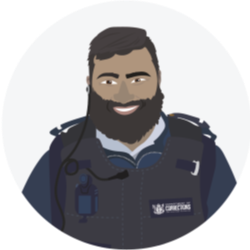Key people in prison
People in prison have many different supports available to ensure their safety, health and wellbeing. Some of them are Corrections staff and others are contractors or volunteers.
 Case Manager
Case Manager
A case manager can help someone in prison to:
- Plan their journey towards improved wellbeing
- Choose the right programmes, education and other activities based on their needs and goals
- Facilitate hui/meetings with whānau, or other supports as needed
- Keep progressing through their plan, updating it when needed and identify any new needs
- Help prepare for release from the facility back into the community
Bring together and support those who are involved in a person’s journey (this can happen from the time they enter the facility to the time they leave).
 Corrections Officer
Corrections Officer
A corrections officer keeps people safe. They can help someone who is in prison to:
- Get settled into their unit
- Answer questions about things like facility routines, rules, their sentence etc.
Make sure they get the things they are entitled to e.g., showers, meals, time outside and phone calls.
 Nurse
Nurse
Corrections nurses provide healthcare to people in prison. Nurses screen for and help manage illnesses and injuries, provide medications and vaccinations, and check on people’s wellbeing. Everyone sees a nurse when they first come into custody.
Nurses can connect with a person’s community health provider (e.g. their doctor) to understand their health needs.
They also help someone to see a doctor, physio or dentist, if needed.
 Programme Facilitator
Programme Facilitator
Programme facilitators deliver bi-cultural rehabilitation programmes in prison to:
- Help people understand and address the causes of their behaviour
- Create a positive future
- Help people learn better ways of thinking and acting, so they don’t cause harm and stop offending
- Support their ora, strengthen their wellbeing and prepare for their release.
Programme facilitators work with people one-to-one and in groups and may also have whānau contact during the rehabilitation to support the persons journey.
Probation Officer
Most people will have a community sentence when they leave prison (e.g. parole conditions). They will work with their allocated probation officer, who can:
- Support them to continue their journey towards improved wellbeing
- Help them to keep progressing through their plan, updating it when needed and identifying any new needs
- Enable them connect with community services and supports in their area
Support them to keep to the conditions of their sentence in the community and hold them to account if required.
 Bail Support Officer
Bail Support Officer
Bail Support Officers provide judges with information to help them make decisions on bail applications.
Bail Support Officers work with defendants, their whānau and their lawyer to strengthen bail applications and identify any social needs that they want help with (e.g. finding accommodation, employment or healthcare).
Volunteer and special roles
Pou Arahi
Someone in prison can ask a Pou Arahi, or another cultural supporter, to help them connect with whānau, hapū, and iwi. These connections bring support that can help people while they are in our facility and when they return home too.
Kaumātua and Kuia
Kaumātua and kuia visit prisons to manaaki the people there. They share pūrakau (stories, legends).


